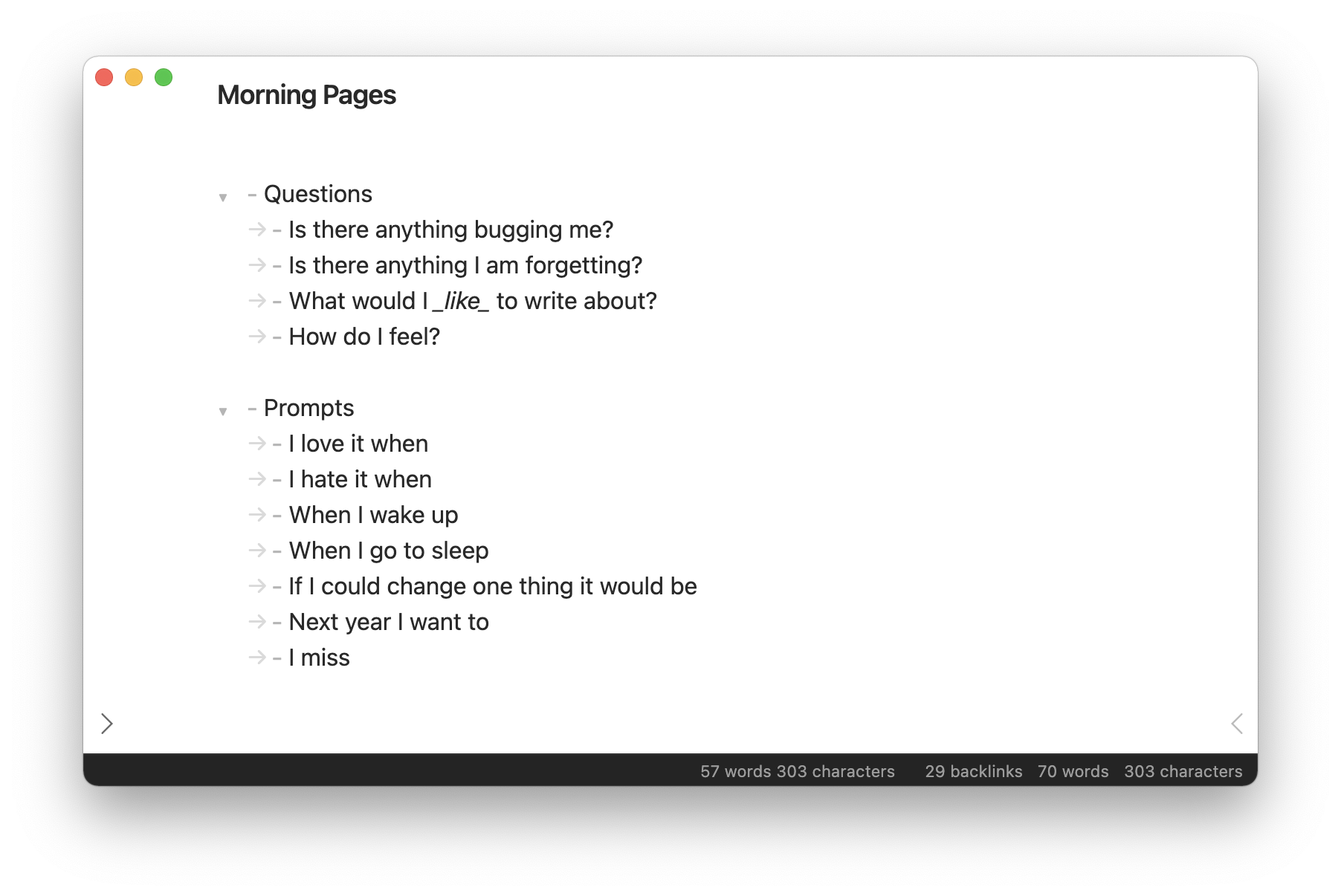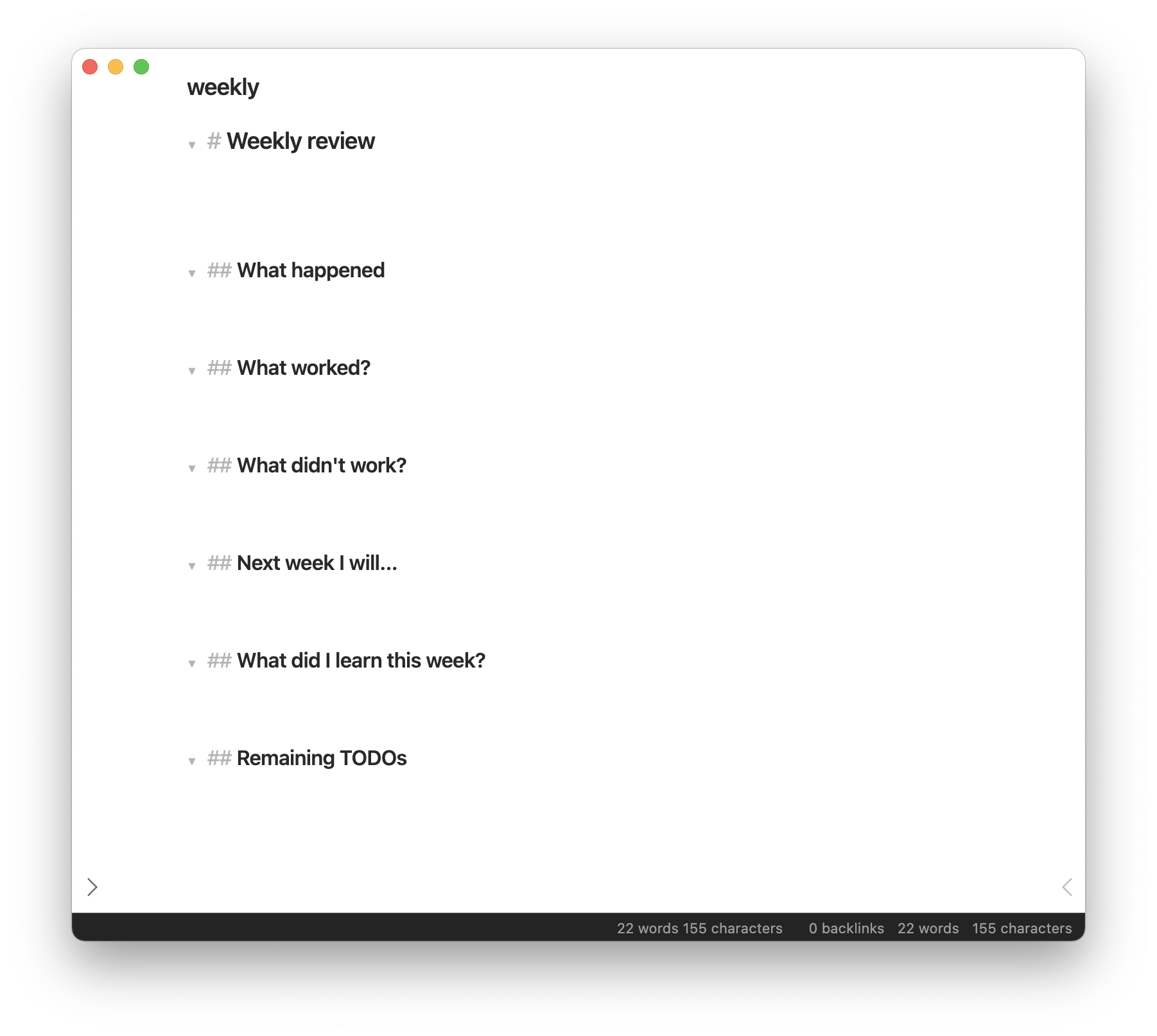A quick review of my journaling setup as per my previous post:
- A simple bullet journal for daily habit tracking
- Morning Pages
- Keeping a Daily Note
I detailed my BuJo approach in the last post. That is the quickest part of the routine. You could just keep a BuJo and gain lots of benefit. Since I wanted to also boost my creativity and productivity I adopted the two other practices.
Let’s look at The Daily Note first since it forms the backbone of the day’s work. (Feel free to skip this section as it is boring nuts and bolts. Jump to the high-level takeaways below ⤵️) I learned this from using Roam Research.1 When you first open the app, you are faced with a blank page with the date at the top. This seems strange for a Personal Knowledge Management app meant to store your thoughts, but it really is a prompt to help your productivity. It is also a thinking tool, but more on that later.
Basically, you use the Daily Note to log everything that happens throughout the day. It is like mental workbench, often with links to other documents or websites. People structure their Daily Notes in a variety of ways. For example they may start the day with a list of the day’s tasks, write a gratitude or dream journal, etc, etc. There are lots of examples on the web to help you come up with your own template. My current structure is this:

I start out with a Morning Page (more on that below) and a Daily Intention. The Intention is not a todo list but more about reinforcing habits. For example I could put something generally practical like “Work on article X”, but also “get outside” “drink lots of water” or more specific “take some time to think about anniversary presents.” It sets the tone for the day, and are useful when you do your weekly review: you can gauge how well your intentions match up to your actual productivity.
The next section was inspired in part by this video by Ali Abdaal on his Daily Note setup in Roam. Here I log the stuff I did, any media I consumed (podcasts, articles, etc), make a note of anything I thought about throughout the day, and finally there is a prompt to remind me to proactively reach out to someone that I haven’t spoken to in a while. For Consume ideally I should be making a zettelkasten literature note and just linking to that from here.
Usually the content under each of these headings is just in point form, and it isn’t exhaustive. Remember, this is for recording significant things. It is not just a TODO list with checks. I think about “what would Chad from 6 months in the future want to know about what I was doing today?” The answer is not “took out the garbage” to be sure!
Also, sometimes sections are left blank because I didn’t do much that day. One thing I try to never leave blank is the Evening Reflection. The nightly assessment of the day is a key journaling practice. After that, I will try and pull out the 1-3 things that really struck me for the day for What did I learn today?. The kind of thing you might see in a Today I Learned meme (but maybe more serious). In my weekly review, conducted on Sunday nights, I like to gather these gems up for review and to refresh my memory.
Finally, lets talk about the first thing: Morning Pages. This practice comes from Julia Cameron’s book The Artist’s Way. It is form of stream of consciousness writing you do after you wake up, but before you get bombarded by other information like social media, news, etc. I saw somewhere that the worst thing you can do in the morning is roll over and pick up your phone. I think this is really good advice. Your brain is in a special state just out of sleep, some people think it is prime for learning and creativity. I think Morning Pages are a kind of a window into your consciousness. Looking back at the topics that repeatedly come up, I have discovered some things about myself. Plus, blasting out 750 words first thing in the morning is a good workout for the writing muscle. You will never again fear a blank white page!
You can find all sorts of info about Morning Pages online, it is very popular, but you should probably just hear Julia Cameron herself talk about them here.
Sometimes I might have trouble getting started, so I have collected some writing prompts to help out when I can’t quite get going in the morning,

You could keep Morning Pages in a separate folder, but since they are tied to how you feel on a specific day, I like to keep mine filed in each Daily Note, right at the top.
Of course, all of the system can change over time. (Let me know in the comments if you have suggestions).
Each Sunday I will flip through my Daily Notes for the week for a Weekly Review. The template for that looks like this:

It is pretty self explanatory. Anything I set myself to do in that week’s Dailies (eg. finish fleshing out a Literature Note) I make note of in the Weekly, and try to get those out of the way first thing on Monday morning.
Takeaways: personal and professional
Writing is thinking. To write well is to think clearly. That’s why it’s so hard.
David McCullough
Putting a mark on paper gives you a tangible starting point, something to enforce some organization on all those “brilliant” thoughts bouncing around in your monkey mind. Sönke Ahrens, in his book How to Write Smart Notes , says writing is the best facilitator for thinking: the main work is the thinking, the writing is just the tangible result. And you know what? Sometimes you are left with nothing. The process works.
Writing isn’t really about wording. It’s about thinking.
Sally Kerrigan
In my old workplace I was the self-described CWO — Chief Whiteboard Officer. I would always use whiteboards to breakdown problems, leaning into my self-perception as a “visual thinker” (and also roundly mocked by all my co-workers). But it works really well. Writing in the Daily Note and Morning Pages has strengthened my skills as a textual thinker, which is important as someone who writes for a living. I don’t just mean just writing books and magazine pieces, I mean all the emails, documentation, and texts that I write too. Many of us make our living writing even if “writer” is not our job title.
Which makes me wonder: if writing in full sentences reinforces proper thinking, then email — which everyone says they despise — might really be the best form of communication? Instant Messaging is too fast, and things can get lost in person meetings since you don’t get the time for consideration. Automattic has really tried to perfect this with things like P2 blogs. They say less than a third of their communication is done over chat. Communication, they say, is “the oxygen of a distributed company.” No wonder they have cracked the remote work so well.
______

